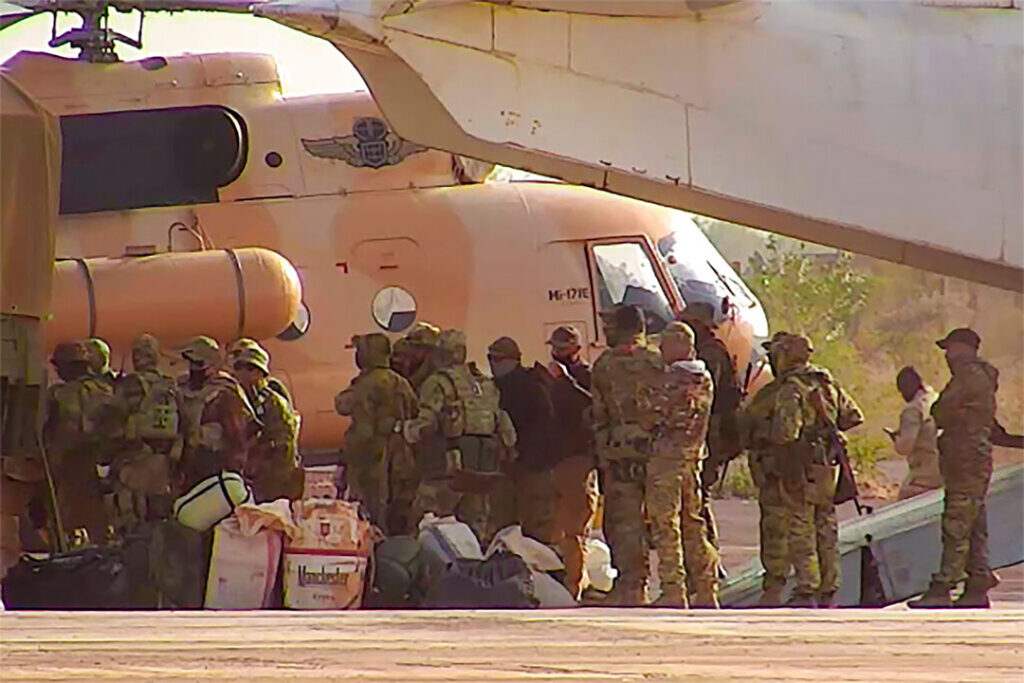ADF STAFF
Thousands of civilians in northern Mali have fled their homes in recent months, running from what they call systematic attacks by Russian mercenaries and Malian soldiers.
Malian researcher Mohamed Issouf Ag Mohamed and professor of African history Mariana Bracks Fonseca recently reported on the actions of the notorious Wagner Group mercenaries who are leading units of the Malian military (FAMa) in the country’s central and northern regions.
“Military actions amounting to ethnic cleansing of minorities are underway, combined with discriminatory propaganda calling for violence against and persecution of all civilians who wear turbans or other clothing typical of nomadic populations,” they wrote for the blog Africa is a Country on March 5.
The Russian mercenary group, which has rebranded itself with the name Africa Corps, now operates under the direct authority of the Russian Defense Ministry.
“This is the Russian state coming out of the shadows in its Africa policy,” Royal United Services Institute land warfare specialist Jack Watling told the BBC. “What the Russians have provided is a strike force, with helicopters with advanced capabilities and a lot of firepower.
“They are using pretty traditional Soviet anti-partisan methods. You see fighters who were executed, as well as civilians targeted for enabling or being associated with fighters.”
Mohamed and Fonseca say Russia’s Africa Corps is terrorizing the Fula, Tamasheq and Moura tribes.
“Violence does not spare the elderly, women, and children, who have their homes burned down and their land, livestock, and little wealth stolen,” they wrote.
In January, a Kidal-based civil society group documented summary executions, massacres, forced disappearances, arbitrary detentions, acts of torture, destruction of sources of water and food, deliberate destruction of public and private infrastructure.
“The main targets of these violations are the Tuareg, Arabs [Moura] and Fula,” the Kal Akal Association wrote in a bulletin posted on Facebook.
The group also reported systematic robberies “wherever Wagner and FAMa went,” several rapes, two mass graves with dozens of bodies in the Timbuktu and Kidal regions, and cases of explosives planted on corpses, a known Wagner technique designed to maximize casualties.
The Tuareg-led Permanent Strategic Framework in August 2023 accused Mali’s junta leaders of deliberately breaking a cease-fire that dated to 2014 as part of the Algeria peace accord.
In November 2023, Malian forces led by Russian mercenaries regained control of Kidal, a town that had been a Tuareg rebel stronghold since 2012. FAMa and the Africa Corps have since used it as a base to attack some of the groups that signed the now-abandoned 2015 peace agreement.
“The separatist armed groups are very influential in the northern part of the country,” said Jean-Hervé Jezequel, Sahel director for the Crisis Group research think tank, during a March 1 podcast on the organization’s website. “They lost their headquarters, Kidal. Currently they don’t have much capacity to attack Malian forces, but there is little doubt that they are trying to regroup. It’s likely that they are preparing to launch a new offensive.”
Jezequel said the efforts by Malian and Russian forces in the Kidal region have had the effect of worsening the country’s overall security.
“Meanwhile, the jihadist groups have not been weakened,” he said. “The al-Qaida coalition, JNIM, is extremely active in central Mali, and they disturb the narrative that Bamako is able to improve security.”
While looting by Russian mercenaries reportedly has been widespread, the Africa Corps is following the established Wagner Group blueprint of seeking mining concessions as part of its payment. In Mali, the outfit reportedly charges $10 million a month for the services of its 1,000 fighters.
Analysts have pointed out that the Malian military offensive against Tuareg separatists in the north coincided with its efforts to secure mining sites.
The February 15 edition of the Salafi-Jihadi Movement Weekly Update, published by the Institute for the Study of War, reported that Wagner and Malian forces captured the Intahaka mine in Mali’s Gao region on February 9.
“This offensive and subsequent operations have conveniently put the Russian mercenaries closer to the hundreds of unregulated artisanal gold mines in northern Mali’s Gao and Kidal regions that the rebels had controlled,” the bulletin stated.
“[Russia] will likely attempt to expand its influence over northern Mali’s artisanal mines to bolster the Kremlin’s sanctions evasion efforts. The Kremlin has used this playbook to accrue billions from artisanal mines in Sudan, contributing to the $2.5 billion in gold the Kremlin has generated in Africa since it invaded Ukraine in 2022.”

